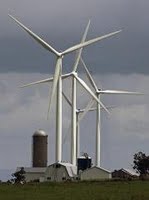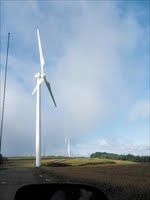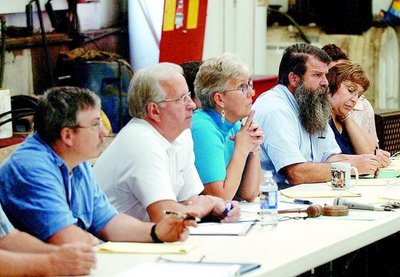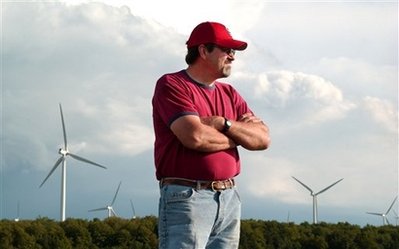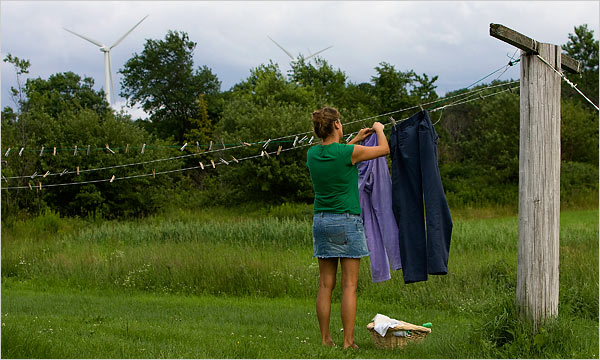Area Opinions Changing
Opinions shift on Rochester-area wind farms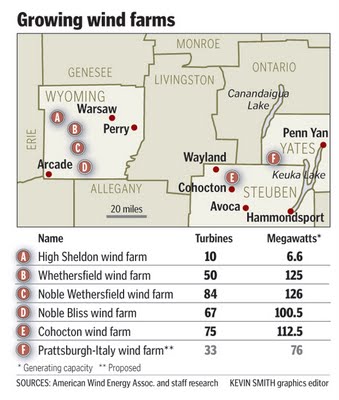 Wind-energy developers, who have flocked to the breezy hills south of Rochester, now are finding parts of the region a less-than-hospitable one.
Wind-energy developers, who have flocked to the breezy hills south of Rochester, now are finding parts of the region a less-than-hospitable one.
A cross-border project has been blocked by local officials in Steuben and Yates counties, prompting aggressive lawsuits by the developer involved. Another wind-energy company just walked away from a planned project in Steuben County. And most recently, a Wyoming County citizens group has challenged a town board action that paved the way for a new wind project there.
Some say the shine has worn off an industry that in many communities had been welcomed both for its green image and its ability to pump money into the local economy. “I’m detecting a shift in the climate of opinion,” said Gary Abraham, a Cattaraugus County lawyer who has represented citizen groups in litigation related to wind projects.
The head of a statewide green-energy advocacy group said the public overwhelmingly supports wind energy, but despite that, discord and litigation in host communities has become an unfortunate fact of life. “Certainly it sends the message that it’s not going to be easy to get something done in New York. That being said, there are still a number of projects going forward,” said Carol Murphy, executive director of the Alliance for Clean Energy New York.
Indeed, the region remains a center of wind-energy development. Wyoming County has four wind farms with 236 turbines, more than any other county in the state. There is a working wind farm in Cohocton, Steuben County, as well. Those five projects have the capacity to generate up to 470 megawatts, which represents the electricity demand of about 200,000 households. Those 470 megawatts are a little more than a third of all the wind-generation capacity in the state. Nearly two dozen other wind-farm proposals in the Finger Lakes and western New York regions remain on the books of the agency that oversees New York’s electric grid, though developers have yet to make formal applications to town boards for many of them.
Of late, though, there has been a spate of controversy over the farms.
A citizens group in Orangeville, Wyoming County, filed suit last month against the Town Board there, asserting it had adopted an inadequate local wind-turbine siting law to make way for a 59-turbine wind project. That case has been assigned to a Supreme Court justice in Buffalo.
After supporting Ecogen Wind LLC’s 17-turbine proposal for years, the Town Board in Italy, Yates County, acknowledged growing citizen opposition by voting in October to kill the development. Observers said Italy’s board may have been the first in New York state to vote down a wind project. A suit by Ecogen asking a judge to override the Town Board and allow the project to proceed is pending before a state Supreme Court justice in Rochester.
Ecogen similarly sued the board in neighboring Prattsburgh, Steuben County, where the company has hoped to erect 16 more turbines. Pro-wind board members briefly settled the case in Ecogen’s favor before leaving office in December, but after a series of courtroom skirmishes, the newly seated Town Board canceled the settlement and declared a moratorium on wind-energy development in the town. Ecogen’s suit still is pending.
Another wind project proposed for Prattsburgh that had been in planning stages for years was formally canceled at the end of 2009. John Lamontagne, spokesman for developer First Wind, said the project was deemed expendable in light of the shaky economy. The Massachusetts company, which was given $75 million in federal stimulus aid in partial compensation for the 50-turbine farm it built in Cohocton, will pursue other projects in Erie County, New England, Utah and Hawaii, Lamontagne said.
Abraham, who represents the citizens group suing the Orangeville board, said he believes public opposition to wind developments is growing. Residents most often cite concerns about noise and the setback provisions that dictate how close turbines can be to homes and adjoining properties. He said, though, that he thinks elected officials often pay less attention to those concerns than they do to a project’s financial benefit to friends and family members. “They’re decided based on the importance the town (board) assigns to the money issue. That’s really the deciding factor. It’s not the environment,” Abraham said.
Murphy disputed the idea that people in host communities are turning against wind farms. “It’s the old adage about the silent majority. It doesn’t take more than a few people to stand up at a town board meeting and make a lot of noise and give people the impression there’s no support for it,” she said. Murphy cited a 2008 public opinion poll in Lewis County — home to Maple Ridge, which at a 322-megawatt capacity is the largest wind farm east of the Mississippi River — that found 71 percent of residents thought the wind farm had had a positive impact. Nearly 80 percent of respondents said they would support more turbines. “There’s always a lot of apprehension when there’s something new and something people aren’t used to seeing, but once they (turbines) are there we’ve found the level of support continues to grow over the years,” she said.
By Steve Orr, Staff Writer, Rochester Democrat & Chronicle




